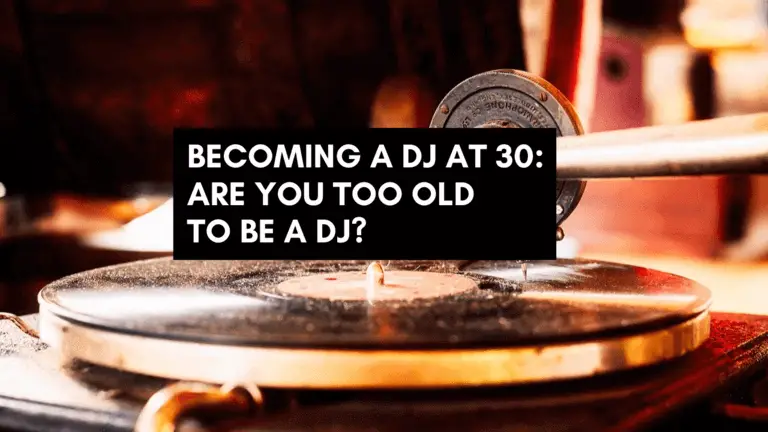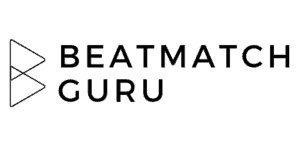
I started out DJing when I was younger around 14 years of age. A lot of my friends ask me “how do you DJ so well” or they say “I’d love to DJ like you, it looks so cool”. It’s a great feeling to be able to DJ and I’d say it’s certainly possible to learn how to DJ at any age you are in your life.
Becoming a DJ at 30, is it possible? Yes, it is possible to DJ at 30. There are many DJs that start later in life as a DJ. DJing is a skill and requires learning the basic skills such as beat matching and using DJ equipment. Practicing to a schedule on a regular basis will allow for you to become skilled at DJing sooner rather than later.
Learning to DJ is fun and will be very satisfying and addictive when you become skilled at beat matching, selecting tracks and creating mixes. Don’t feel that age can get in the way. Let’s explore a few things to consider learning how to DJ from the age of 30, or any age for that matter.
Never DJ’ed before? Are you new to DJing?
If you are new to DJing and want to learn quickly, then my advice would be to get a decent lesson or tutorial to learn the basics. From there create a practice schedule on a daily and weekly basis.
In order to learn any new skill some experts say that there’s a rule of 10,000 hours. Practice makes perfect, and continuous practice and learning makes you unstoppable in your abilities.
In any case, if you are dedicated enough to learn a new skill such as DJing, then you will achieve your goal of being able to DJ. Age should not and I’m telling you, will not stop you from being able to DJ.
Did you DJ years ago?
If you used to DJ when you were younger, say in your teens and then eventually quit for whatever reason, then you’re one step ahead of the game.
This is a great position to be in. You will have a lot of the basic skills hidden away in the back of your mind. Jumping onto your old turntables or re-investing in some new CDJs or DJ controller will give you a boost back into the old memory bank. It will be like riding a bike.
The key things you will need to remember are how to beat match using the pitch shift, dropping a track in at the right beat to help achieve phrase matching tracks together.
DJing as a Hobby vs Professionally
DJing as a hobby DJ is great. You can set up your DJ equipment at home in a dedicated room, your communal living space or studio / games room. It’s great fun to be a hobby DJ, especially if you have guests over for a party and a few drinks. Playing all the old school tracks and reminiscing is always a great angle for a party especially to share with close friends that might DJ too.
DJing professionally is a different angle, but not impossible. There are considerations to take on board when thinking about approaching DJing as a profession.
If you’re in a 9 to 5 job and are transitioning to another career such as DJing then the below areas will give you a heads up before you start.
- Hours – The hours that you operate as a DJ will likely be odd and out of kilter compared to doing other jobs such as a 9 to 5 type job. The hours will be infrequent and potentially late nights, so be aware and prepared for this. Sometimes the hours of being a professional DJ can be un-sociable for your home life, so be aware of that.
- Locations – The destination of where are booked to be a DJ can be in a vast array of places from where you live. You might be able to drive 50 minutes from your home or it might require you to get a train or even plane. Preparing to travel is very important to being a professional DJ.
- Business Minded – You will essentially become a business when being a DJ in a professional capacity. You will need to learn marketing skills to be able to market and network to enable you to get gigs. Managing costs and prices will become a daily experience when being a professional DJ, negotiation skills are particularly important.
- Music Trends – keeping on top of the latest music trends is key when being a DJ. You will need to have the latest tracks on your laptop or in your music collection to please the crowds. So this will take up a decent chunk of your time and will require you to keep on top of.
- Lifestyle – Your lifestyle will change a lot when becoming a DJ, especially in the professional side of things. You will be expected to work late nights and hours when your friends and family are out socialising. It’s worth being aware of this before approaching DJing professionally.
- Investment – To offer yourself as a professional DJ with DJing services, especially a mobile or wedding DJ for example, you will need equipment. DJing equipment can be inexpensive but you do need quality equipment all the same. You will need turntables or a DJ controller, Laptop, music tracks, lighting, smoke machine etc etc, the list goes on. Make sure know which type of professional DJ you want to become and the costs associated to it.
Tips & Advice to Become a DJ at Any Age
Attitude – If you have an attitude that is negative and a pessimistic outlook on life then it’s likely you’re not going to become skilled at DJing at any age in your life. Know that you can and you will learn how to DJ and become a DJ (hobby based or professional) then it’s likely you will be success.
Start out as hobby based DJ – Get the basic skills under way, practice DJing and see where it takes you. You don’t want to put all your eggs into one basket by quitting your job and simply going for it to become a professional DJ.
Regardless of whether you have loads of money in the bank to support you or not. You may not enjoy DJing as much as you thought. So give it a go first and then have a commitment based decision to being a professional DJ from there.
Learn to read the crowd and have empathy for the crowd – You will need to learn how to adapt your music to the audience. Don’t let your age and music tastes get in the way of playing the music that the crowd are expecting you to play.
That’s why DJing for fun might be more up your street. You can play whatever music you like at home and for your friends and family to enjoy.
Keep learning how to become a better DJ – There’s always new technology, software and equipment that’s coming out in the market for DJing with.
Keep on top of the DJ equipment that’s releasing as industry standard equipment might be updated or might of updated since you last DJ’ed. This is especially important if you’re looking to DJ in bars and club events again.
Learn how to use DJ software – Serato, Traktor and Rekordbox are all standard and well known DJ software available on the market. Used well can help you become an amazingly efficient DJ and help you get the crowds dancing.
For example, organising and arranging DJ sets are so easy to achieve and also setting cue points can help you DJ with ease. This might be something you’re not used to if you were used to DJing with record vinyls back in the day, or this is equally good advice for new DJs to learn ASAP.
Related Questions
Is being a DJ a good career?
DJing is a great career. Being a DJ is social, creative and can be great money. It’s possible to travel a lot to different destinations around the world, meet many new people and play music in front of large crowds of people having fun.
Is being a DJ hard?
DJing can be hard at times due to the amount of competition there is however, depending on the type of DJ you want to become can dictate how competitive your career might be, such as a Club DJ, Radio DJ, Wedding DJ or DJ Producer.
What skills do you need to be a DJ?
Skills to be a DJ include music related abilities which include, rhythm, knowledge of BPM, harmonics, song structure and phrasing. Soft skills required to be a DJ include inter-personal skills for networking, confidence to play in front of crowds, business acumen and creativity.
